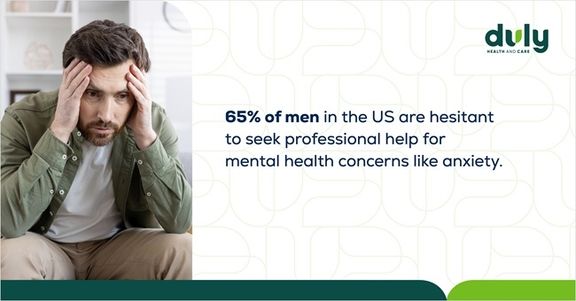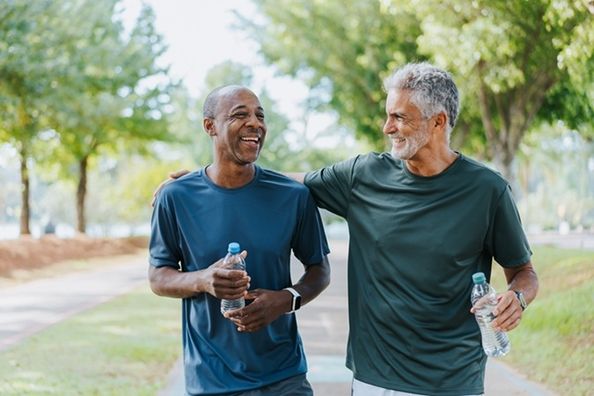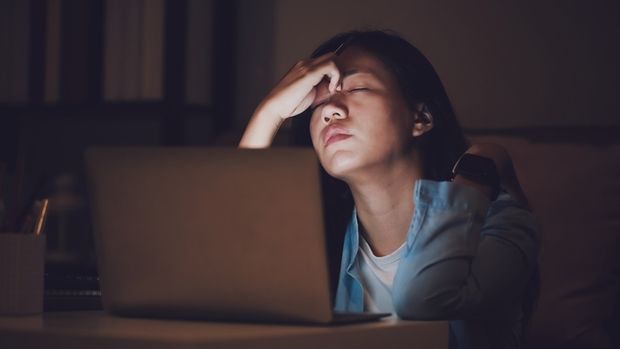Everyone has a little anxiety now and then. Whether it’s while studying for a test, getting ready for a job interview, or awaiting news, it’s normal to sometimes feel anxious. But if anxiety is intense or excessive, gets in the way of your day-to-day life, or doesn’t go away, it could be a sign of an anxiety disorder.
Anyone can develop anxiety, but it’s sometimes thought of as a problem that mainly affects women. It’s true that women are almost twice as likely as men to be diagnosed with an anxiety disorder at some point, yet that might not tell the whole story. Men may have different symptoms and be less likely to get help, so the number of men who have an anxiety disorder could be higher than what is reported.
Here’s how anxiety looks different in men than it does in women, and what you can do if you have anxiety.
Male Anxiety Overview:
- Men may experience unique anxiety symptoms such as aggression, irritability, headaches, muscle tension, and panic attacks.
- Coexisting conditions in men with anxiety often include ADHD, intermittent explosive disorder, and substance use disorder.
- Men are more likely to bottle up anxiety or self-medicate with alcohol/drugs, while women more often seek professional help.
- Anxiety in men can put extra strain on romantic relationships if emotional support is limited to a partner.
- 65% of men in the U.S. are hesitant to seek mental health treatment, often due to stigma, lack of insurance, or no regular healthcare provider.
- Anxiety is highly treatable. Many people see improvement after 8 – 10 therapy sessions, especially when combined with medication and healthy coping strategies.
Also read: How do I Know if I Have an Anxiety Disorder?
Symptoms of Anxiety Can Be Different in Men.
Certain symptoms, like feelings of fear or dread and difficulty concentrating, are the same across the board. However, others are more common in men than women.
Men with anxiety are more likely to experience:
- Aggression
- Anger
- Headaches
- Muscle pains
- Panic attacks
Men and Women Have Different Coexisting Mental Health Conditions.
It’s normal to have more than one mental health condition at a time, so many people with anxiety also struggle with other mental health challenges. In fact, some estimates show that 60% of people with anxiety have symptoms of depression, as well.
And it’s not necessarily the same across genders or disorders.
Depression isn’t quite as common for men with anxiety as it is for women. When men have other mental health conditions in addition to anxiety, they’re more likely to be diagnosed with:
- Attention deficit/hyperactivity disorder (ADHD)
- Intermittent explosive disorder (sudden and repeated episodes of violent, impulsive, and aggressive behavior or angry verbal outbursts)
- Substance abuse disorder
The relationship between anxiety and bulimia nervosa (an eating disorder) is particularly interesting. In general, women with anxiety are more likely than men to be diagnosed with bulimia. However, there’s a catch. With bulimia, race and ethnicity also play a role. Hispanic men with anxiety are actually more likely to be diagnosed with bulimia than Hispanic women with anxiety.
Also read: Batting a Healthy Thousand-Your Men’s Health Playbook
Men Handle Anxiety Differently.
Women tend to be more open about their anxiety and to express their emotions. They’re more likely to seek help (such as talking to a therapist or counselor), take anti-anxiety medication, or avoid situations they know provoke anxiety.
Men, on the other hand, are known to bottle up their anxiety and let it fester. Instead of getting help from a professional or taking medication, they may self-medicate with alcohol or non-prescription drugs. Eventually, keeping it inside and not getting the right treatment can lead to explosive behavior.
Male Anxiety Might Have a Greater Effect on Romantic Relationships.
Willingness to talk about anxiety can greatly affect a person’s romantic relationships, which can be especially problematic for men.
Since women are generally more open about anxiety than men and have large social circles, it’s not unusual for them to talk about anxiety with their friends. They get plenty of support from their friends and don’t need to “take it out” on a single person.
That doesn’t mean that anxiety never affects a woman’s relationship with her partner. However, it may be a little less likely than it is for men.
If a man is uncomfortable talking about anxiety with a larger group or mental health provider, they might only open up to their partner. This can put a lot of stress on the partner and make them feel like they have to take on the role of therapist. Unfortunately, this can take a toll on the relationship.
Why Are Men Less Likely to Talk About It or Get Help?
One of the main reasons is stigma – and it extends to more than anxiety. Men are less likely to get help for any mental health condition.

Men often feel that getting help for mental health challenges makes them weak. They may think of it as “not manly” or believe that it’s something to just tough out.
There are other factors at play, too. Even if a man wants to get help, care might not be as accessible. Men are more likely to be uninsured and are less likely to have a usual source of healthcare, so they might not be able to afford care or know how to get it.
However, there is good news on the treatment-seeking front. While they might still be less likely to do so than women, an increasing number of men are getting help. This is especially true among adults in the 18 to 44 age range.
Also read: Debunking 8 Myths About Seeking Mental Health Therapy
What Should You Do If You Have Anxiety?
If you’re experiencing symptoms of anxiety, the most important thing to do is to get help. Untreated anxiety can greatly affect your quality of life, from making you uncomfortable in social situations to increasing your risk of other serious mental health conditions like depression or substance use disorder. In severe cases, untreated anxiety can even increase your risk for suicide.
Fortunately, anxiety is highly treatable. Many people see significant improvement in their symptoms after 8 to 10 therapy sessions, and some see even more if they combine therapy with anti-anxiety medications.
There are also lifestyle changes you can make, like managing stress, going to a support group, cutting back on caffeine, practicing relaxation techniques, and staying physically active. Just make sure you’re doing these in addition to getting help rather than instead of it – it’s best to work with a professional rather than try to treat anxiety on your own.
Caring for your mental health is just as important as caring for your physical health. If you’re ever feeling embarrassed or alone, rest assured that there are many men in the same boat as you. You don’t need to be ashamed of having anxiety or getting treatment.
Taking care of your mental health isn’t weak, it’s smart. Schedule an appointment with a Duly Health and Care mental health provider who gets it. Your first step toward feeling better is just one appointment away.
Health Topics:





